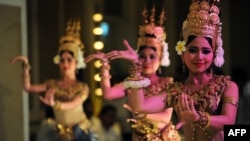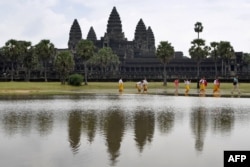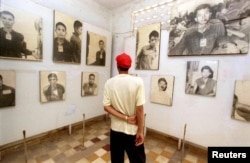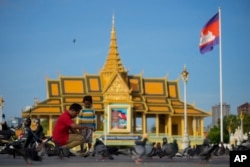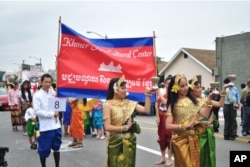Students in California’s public schools could soon start learning about Cambodia’s long history and vibrant culture, after a law was passed in October setting in motion a model curriculum that will be made available across the state.
Sponsors of the bill, SB 369, are hopeful that the curriculum could be adopted in other states too. Signed by Gov. Gavin Newsom (D) earlier this month, the law funds the creation of a Cambodian curriculum — as well as separate Vietnamese and Hmong curricula — by 2024.
Sen. Lena Gonzales, a Democrat, represents a district that includes Long Beach, Calif., which is home to the largest Cambodian community outside of Cambodia. She said officials in the northeastern state of Massachusetts, the second largest Cambodian-American community, have also expressed interest.
“It's pretty neat for us to know that we started here with an idea…and now this is moving to other places across the nation,” the state lawmaker said.
The Orange County Department of Education has been contracted to develop the curriculum, which will be made available statewide. Department spokesperson Vicky Nguyen said they are aiming to complete the curriculum by June 2024.
“Following this, OCDE will lead the rollout of the curriculum to ensure that educators who are interested have the necessary resources and support for effective implementation,” Vicky Nguyen told VOA Khmer.
The model curriculum will provide teachers with everything they need to integrate Cambodian culture history and curriculum into their courses or classes, such as lesson plans, primary documents and teaching strategies.
‘Cambodia has a lot to offer’
Richthida Bovannak, 20, was among the young Cambodians who joined community discussions during the development of the bill. She studies fashion at the University of California, Long Beach, and grew up in the city. Despite growing up surrounded by Cambodian culture and regularly visiting Cambodia Town in Long Beach, she said her home country was rarely mentioned in classes at schools she attended.
“They'll have one mention of like, oh, Vietnam and Cambodia are next to each other. And that will probably be the only mention. And I'll be like, dang, I wish they talked about Apsara or like Angkor Wat, that'd be so cool for my classmates to know,” she said, referring to the classical Cambodian dance and iconic ancient temple complex.
“So hearing that students now will probably learn more about the rich culture of other Southeast Asian places… it will definitely make them more aware of other cultures that exist. Even though we're small, we're still equally as important as others,” Richthida Bovannak told VOA Khmer.
The Cambodian curriculum was initially introduced in 2018 with a narrow focus on Cambodia’s genocide in the 1970s, during which some 2 million Cambodians were killed by the murderous Khmer Rouge in their extremist agrarian revolution.
But that changed earlier this year, when the bill was amended to expand its focus to Cambodia’s full history and cultural heritage. That revision was driven largely by the advocacy of Leakhena Nou, a Cambodian-American sociology professor at University of California, Long Beach.
Richthida Bovannak said she also felt it was important to cast a broader lens on Cambodia’s history, including the experience of Cambodian-Americans like her.
“I think Cambodia has a lot to offer in terms of arts. Even from the beginning — like the golden age of Cambodia before like genocide happened — it was this rich age of art and expression,” she said.
“When you go there too, there's just so much architecture, so much special fabrics, jewelry, dance, like there's just so many aspects that I think are really beautiful, that are not shared to the world. I think when people do learn about it, they'll be amazed.”
Sovanna Pouv had a similar memory of how often his home country was mentioned in school — rarely and mostly in relation to the Vietnam war. As a field representative in Sen. Gonzales’s office, he said he was proud to be part of changing that for the next generation.
“From my personal experience, many people know about Cambodia either through to genocide or Angkor Wat,” he said. That also applied to fellow Cambodians who are part of “generation 1.5,” the children of immigrants and refugees, he added.
“We look forward to seeing that come to fruition and to empower our children to like, learn about our history in detail and to not only learn about the dark times, but also the bright times before the genocide and after the genocide as well,” Sovanna Pouv said.
“And we hope this will fill people up with the history of the country…and give people an understanding of why people in the Khmer community have so much pride and culture behind our history as well, like why we want to hold on, why we don't want to let it go.”
Rocky road to passage
Leakhena Nou, the sociology professor, began her push to expand the focus of the legislation in 2022. She ultimately drafted new language that was largely adopted into a revised bill in March, just in time for the deadline for it to become law this year.
But she isn’t celebrating its passage. She says the bill’s sponsors — state Sens Janet Nguyen (R) and Gonzalez — are taking credit for her work, and shutting her out of the very history she helped write.
“They're lying to the Cambodian people,” she said of the sponsors. “And I'm saying this to all the Cambodian people that are listening. I request that you challenge these politicians and ask them the genesis of this bill. Who wrote the bill and who pushed for the amendment?”
Leakhena Nou wrote two open letters, in December 2022 and May 2023, first demanding the legislation be revised to expand its purview beyond the Khmer Rouge, and then demanding due credit for her contributions.
Gonzalez, during an interview with VOA Khmer earlier this month, said that Leakhena Nou was one of many voices who contributed to the final product.
“She's been very, very active and providing her thoughts on what this could look like,” the senator said, noting that other academics, grassroots advocates and community groups were also involved.
“But I don't know what else she really needs from us because we were there with her holding her hand and listening to her every step along the way,” the senator added.
Nareth Muong, a Khmer language access specialist for the city of Long Beach, said he joined the debate over the bill around the same time that Leakhena Nou did, and worked with her on the push for change.
“Dr. Leakhena Nou is really the bread and butter of this whole process from the very beginning,” Nareth Muong said.
However, he added she “took a very kind of tough road in her approach in dealing with this,” and left other elders, educators and officials involved in the process feeling “upset by the way she addressed the issues.”
“But then, to kind of kick her out of the loop by not really acknowledging her work. To me. it’s not ethical,” he said.
At the end of the day, the Cambodia-focused curriculum will be the first of its kind in America’s public schools, “which is really a big thing,” he explained.
Gonzales noted that a new chapter of Cambodian-American history had recently begun in Long Beach, with Suely Saro becoming the first Cambodian elected to its city council. And she said the model Cambodian curriculum needed to account for that evolution.
“I really do feel like it was a pivot point just locally for us to start thinking broadly, about how we need to uplift the voices of the successful stories,” she said, noting Cambodians were also leaders in the arts, academia and in restaurants.
“And not just having that context for Long Beach, but across California, and really, hopefully, across the nation as well.”




